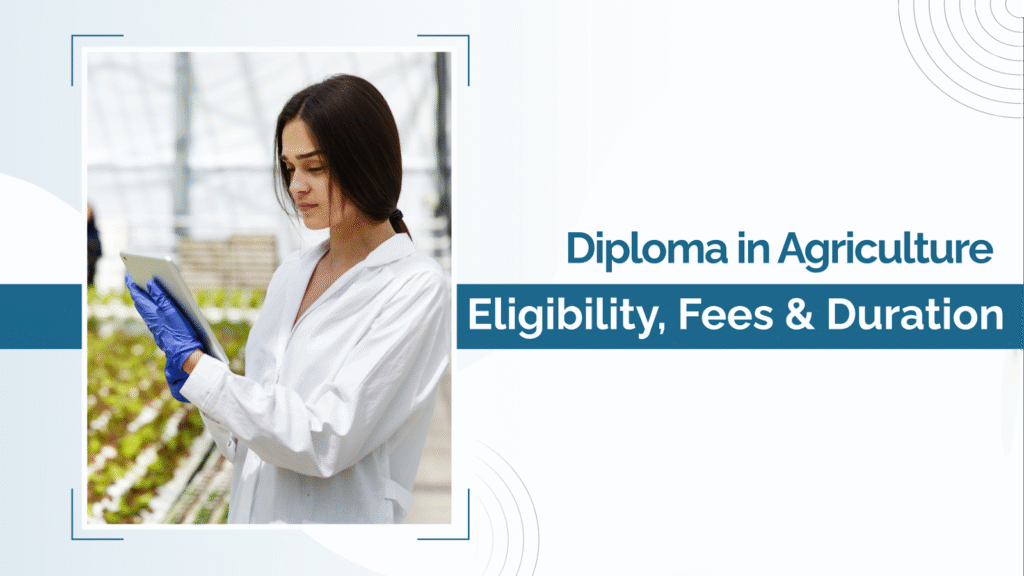The second-largest producer of agricultural products is India which employs more than 45 percent of the workers of the nation. As the demand for food production and sustainable agriculture increases, experienced individuals in the field of agriculture have become even more significant.
A Diploma in Agriculture is one of the fastest-growing vocational courses designed to meet this demand. This blog will cover all the information regarding this field, including its applicability to a career, so that students can anticipate a better future in the field of agriculture.
What is a Diploma in Agriculture?
A Diploma in Agriculture is a short-term course that focuses on the scientific study of farming practices, crop management, and agri-business techniques. It is a vocational course that best suits the students who desire to have a tangible course instead of purely theory-oriented education in rural and semi-urban backgrounds.
Main features of this course:
- It provides exposure to soil science, irrigation, and pest control, in both technical and practical aspects.
- The program aims to facilitate contemporary and sustainable agricultural activities.
- It is an entrance to top learning or direct admission into the farming and agri-business sector.
This course fits the students who wish to get into government or commercial sectors in the field of agriculture as soon as they finish the course
Diploma in Agriculture Course Details
A diploma agriculture course is structured to be industry-ready, with a focus on fieldwork and lab training.
Duration:
- Normally 2 years (4 semesters).
- In some colleges, there can be a fast track of 1-year programs.
Course Fees:
- Their fees are between INR 15,000 to 50,000 per year.
- Scholarships are meant to be awarded to SC/ST/OBC and economically weaker sections.
Subjects Covered:
The curriculum of the course will involve:
- Agronomic principles
- Management of Soil and Water
- Plant Pathology
- Agricultural Engineering
- Horticulture
- Poultry farming and Animal Husbandry
- Agri Economics and Marketing
- Weed Control and Crop Production
Course Type:
- Full-time
- Provided by the government and private institutions
When choosing the right diploma agriculture college, students must check for AICTE/UGC approval, campus training, and placement support.
Eligibility Criteria for the Diploma Agriculture Course
The eligibility to apply for the diploma in agriculture is simple, making it accessible for students from all walks of life.
These are the minimum requirements:
- Qualification: SSC /10th (recognized board).
- Minimum marks: 50 percent aggregate marks (relaxation towards reserved categories).
- Age Requirement: 15-25 years (institution to institution)
- Additional Requirements:
- Other colleges can also carry out entrance exams.
- In certain institutes, a direct merit admission requirement.
Some institutions are also taking up students after 12th standard (Science stream) to study advanced diploma courses.
Higher Study Option after Diploma in Agriculture
After completing a diploma in agriculture, students can pursue higher studies to gain advanced knowledge and improve career prospects.
Popular Higher Education Paths:
- B.Sc Agriculture
- Agricultural Engineering as B.Tech
- B.Sc.Horticulture or Forestry
- BBA in Agri-Business.
- Integrated MBA (Agri-Business Management)
Benefits of Higher Education:
- Potential of working in research or development.
- Eligibility for government officer-level jobs.
- Opportunity to show in such competitive exams as ICAR AIEEA, NABARD, UPSC.
Students graduating from the best agriculture colleges in MP often go on to pursue these higher studies with excellent support systems and faculty guidance.
Career Scope after Diploma in Agriculture
There is a soaring career scope in the public and private sectors for diploma holders in the field of agriculture. According to a recent survey of the Ministry of Agriculture, India is going to require more than 20 lakh skilled agri-workers in the coming 5 years.
Government Sector Opportunities:
- Agriculture Field Officer (AFO)
- Assistant Krishi Vigyan Kendra
- Assistant of Soil Conservation
- Technician Irrigation Department
- Department Worker Of Forest
Jobs in the private sector:
- Agri-business Firms
- Fertilizer and Pesticide businesses
- Farming Consultants Organic
- Greenhouse Technicians
- Selling and services of Agricultural Equipment
Entrepreneurship Opportunities:
- Setting up an organic farm: Organic farm structure
- Units of dairy and poultry farms
- Commodity and agri-input retail stores
- Crop consultancy services
Job Roles after Agriculture Diploma Course:
- Agriculture Technician
- Field Supervisor
- Laboratory Assistant
- Agri Equipment- Sales Officer
- Manager of crop production
Due to its practical nature, the agriculture diploma course equips students with field-level knowledge, making them job-ready from day one.
Conclusion
A Diploma in Agriculture is more than just a certificate course—it is a career-building program that empowers students with hands-on knowledge, practical skills, and future growth potential. Skilled diploma holders can get opportunities ranging from government employment to private companies and agri-based startups.
This course, with relatively low fees, a limited course period, and good employment opportunities, is a wise investment for any student willing to venture into agriculture. Opportunities are wide-ranging; however, whether you are interested in getting to work soon or pursuing higher education in the future, the program opens some doors.
Choosing a reputed diploma agriculture college like Mansarovar Global University ensures academic quality, field training, and career support. For those passionate about agri-innovation and sustainable farming, a diploma in agriculture could be the first step towards a fruitful career.



